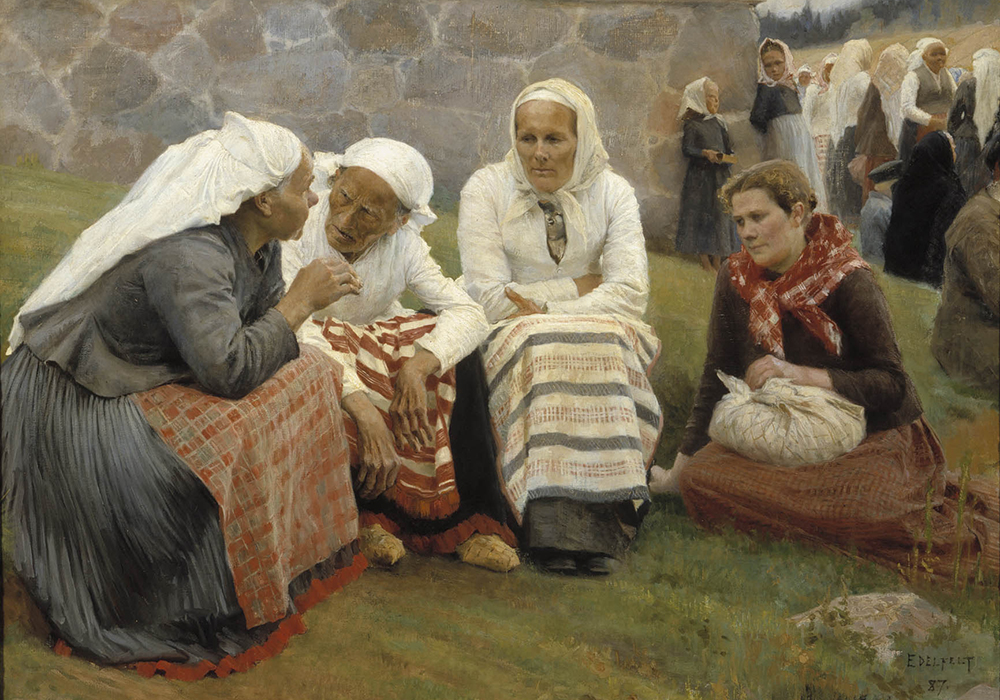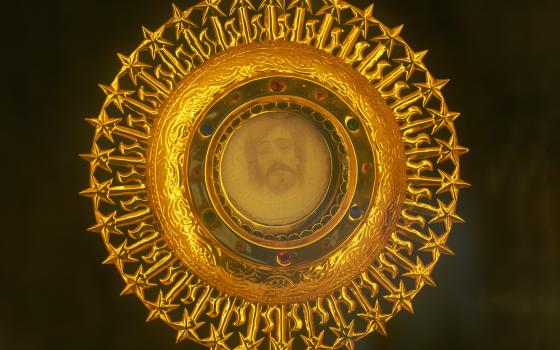
"Women Outside the Church at Ruokolahti," an 1887 painting by Albert Edelfelt (Wikimedia Commons/kansallisgalleria.fi)
Although the vocation of the laity to bring the Spirit of Christ to the "saeculum" or temporal sphere through their involvement in economic, political and cultural realms cannot be ignored, I have encountered women who question the theology of the lay vocation to be salt, light and leaven in the midst of the world, as explained in the post-synodal apostolic exhortation Christifideles Laici.
Of course, the world today greatly needs the involvement of committed laity beyond church compounds; nevertheless, what about laywomen who feel called to roles currently open only to clergy in the Catholic Church? As of now, I think, any decision the Catholic Church might take regarding the sacrament of holy orders for laywomen would put it in a Catch-22 situation.
Pope Francis' recent "no" to women deacons during an interview, when asked about this possibility, was a significant blow to women. After all, the church needs to read the signs of the times and update its mindset and structures. However, if the response were to change to "yes" in the near future, would women clerics be any different from male clerics regarding their use of power, which inevitably would become a privilege?
When I reflect on this question with a genuine desire to discern, I wonder about laywomen who spend several hours daily or weekly serving the church. Over the years, religion becomes an opium for them, and they cannot give up involvement in church activities at any cost. Newcomers don't get a chance to serve and, meanwhile, the younger generation drifts away from the church. This is a well-known issue in India, and steps are being taken to address it.
Moreover, over decades, I have observed the same women involved in multiple parish activities, either as leaders or as participants of several groups or lay ministries, such as lectors, choir, catechists, small Christian communities, charismatic renewal, Legion of Mary, women's cell, and health cell. Parish priests report to the bishop that peer groups and associations in their parishes are active.
This phenomenon is mirrored at the diocesan and international levels, as well. A select group of approximately 200 laypersons are involved in multiple diocesan initiatives. Around 500 individuals, either conservative or progressive, are members of numerous international movements and associations. They feel called to challenge the status quo through prophetic endeavors but often meet online or in person with the same participants. The average age of members of these groups is also increasing.
Advertisement
Recently, during a seminar on women's issues where women participants were in the majority, a priest pointed out that the women organizers (almost all above 65) seemed to favor a select group of participants, while other women on the margins struggled to gain attention and speaking opportunities. On several occasions, similar dynamics have been observed during consultations for the Synod of Bishops on synodality at various church levels. After any document is released by the local or universal church, laity in various WhatsApp groups question why they were not involved in the selection of participants for the process.
Feminists come with heads and hearts of all shapes and sizes. I know many, not only in India and Asia but all over the world. They often share how they cling to the edges of the boat with their fingernails. Frustration deeply pervades their individual and collective consciousness, yet several questions arise in my spiritually discerning mind. Is there even one meeting where a woman does not undermine another woman? This occurs in various forms: indifference, exclusion, discrimination, stereotyping, gossip, cornering, collective bullying, ragging and so on. Only a few are able to rise above differences to stand in solidarity with women who suffer or who are targeted for various reasons.
The causes behind these behaviors could include distorted motivations, a ravenous hunger for power, a desire to be in the limelight, or ideological polarization. Life has inflicted such deep wounds on their psyche that, even though they may seem to act in good faith, they feel justified in using any means to change the direction of the church. Those who think differently often become threats and are treated as outcasts.
Despite these experiences, I have been seriously reflecting on and praying for women's equality in church ministry. Personally, though synodality is very close to my heart and was reflected throughout my doctoral dissertation on spiritual guidance and formation, the outcome of the 2024 synod left me conflicted. In seeking to develop synodal structures, I fear the church is becoming more bureaucratic and clerical than I have ever witnessed in my lifetime.
Sometimes, I feel if access to holy orders or its equivalent were restored for women, the church would go back 400 years before beginning to move forward at full speed because patriarchy has stifled the growth of most Catholic laywomen. While I recently discovered a possible scriptural justification for the ordained ministry of laywomen, it took me time to decide to share my findings with other researchers. A forthcoming column is dedicated to the theme.
I tend to agree with Pope Francis that it is too early to make a definitive statement on women deacons. Yet waiting beyond 2025 would seem too late as well. The question is indeed urgent, and we cannot wait any longer, but aren't we stuck in a Catch-22 situation?




